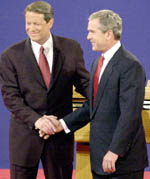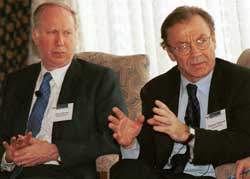Harvard voices heard throughout debate

Tuesday night’s presidential debate between Democrat Al Gore and Republican George W. Bush may have been across town, on Dorchester Bay rather than the Charles River, but Harvard was interested, watching, and — in some cases — there.
Harvard’s voices were heard in the chanting outside the UMass-Boston debate hall, and in the analysis of the John F. Kennedy School of Government’s political experts. Harvard students not only marched in support of Green Party candidate Ralph Nader, they cheered him during an appearance at the Law School’s Ames Courtroom on Tuesday afternoon. A heavily pro-Gore student crowd packed the Kennedy School’s ARCO Forum to watch the debate projected onto a large screen, cheering at some of the candidates’ responses and laughing — or groaning — at others.
Of course, Harvard wasn’t just watching and discussing the debate. The candidates themselves have Harvard roots. Gore graduated from Harvard College in 1969, Bush from the Business School in 1975, and even one of the candidates left out of the debate — Ralph Nader — got a Harvard law degree in 1958.
Kennedy School presidential experts helped set the stage for the confrontation during a luncheon for members of the media at the Westin Copley Place Hotel in Boston on Tuesday afternoon.
Richard E. Neustadt, Douglas Dillon Professor of Government emeritus; David Gergen, co-director of the Center for Public Leadership and Public Service Professor of Public Leadership; and Thomas Patterson, co-director of the Vanishing Voter Project and Bradlee Professor of Government and the Press at the Kennedy School’s Joan Shorenstein Center on the Press, Politics and Public Policy, provided historical context and their views of the contest’s stakes.

David Gergen, Public Service Professor of Public Leadership at the KSG, and Thomas Patterson, Bradlee Professor of Government and the Press at the KSG and co-director of the Vanishing Voter Project, were on hand for “Press, Politics and Public Policy” at the Westin Copley Place in Boston on Tuesday. With the candidates virtually deadlocked going into the debate, the stakes were extremely high, they said. A misstep that costs even a few points could prove the difference come Election Day.
“Our polls show that voters are very much struggling to decide where they stand on the issues,” Patterson said Tuesday. “Twenty percent of committed voters indicate the debate may change their mind. Forty percent of undecided voters say they will watch and may make a choice.”

Post-debate reaction, however, shows that the candidates each did their job: appearing competent enough to handle the presidency while avoiding mistakes. A CNN/USA Today/Gallup Poll of registered voters after the debate showed that only 3 percent changed their minds about the candidates. The poll has a margin of error of plus or minus 4 percent.
But the main story of the first debate is one of missed opportunities, according to Patterson. Bush’s task was to show he has a grasp of the issues and a sense of their relative importance beyond just a knowledge of facts. He missed that opportunity, Patterson said, though he also avoided any mistakes that could have cost him support.
“There wasn’t the huge blunder. He didn’t collapse,” Patterson said.
Gore, on the other hand, missed a chance to put some distance between himself and his opponent. As expected, Gore showed a mastery of details, but he hurt himself with his behavior, Patterson said.
“I think his facial expressions, his grimaces and sighs, did enormous damage to the potential there,” Patterson said. “He always needed to have the final word. I just think it was boorish behavior. He ought to have been in control.”A piece of the election landscape heard but not seen from the debate hall was the thousands of demonstrators who descended on the UMass-Boston site.

“We’re here to send a message and condemn the aggression of the Israeli government against the men and women of Palestine,” said Samer Abughazaleh, of the Cambridge-based Islamic Society of Boston, which had about 150 protesters at the debate.
Among the demonstrators were hundreds of supporters for Green Party candidate Ralph Nader, protesting his exclusion from the debate. The Commission on Presidential Debates has ruled that Nader and other minor party candidates may not participate in the debates because they had not received 15 percent support in national polls.
Chanting “Let Ralph Debate!” demonstrators waved signs and created a human blockade at one of the main access routes to the UMass site. Among them were several Harvard students, including at least one group of about 10 from the Law School.

“I think it’s inappropriate that there’s no safe venue for protesters, no way to get close [to the debate site]. There’s no reason to use pepper spray and tear gas on people. That is unacceptable,” said Michelle Drake, another third-year student at the Law School.
Though typically most attention is focused on the first of a series of presidential debates, the inability of either candidate to draw ahead increases the stakes in the second debate, scheduled for Oct. 11 at Wake Forest University, Patterson said. And, though vice presidential debates have historically had little effect on the election’s outcome, if this Thursday’s debate at Centre College in Kentucky sways enough fence-sitters, it could be significant.
“I think in an election this close, every piece of it begins to count as we move toward Election Day,” Patterson said.




